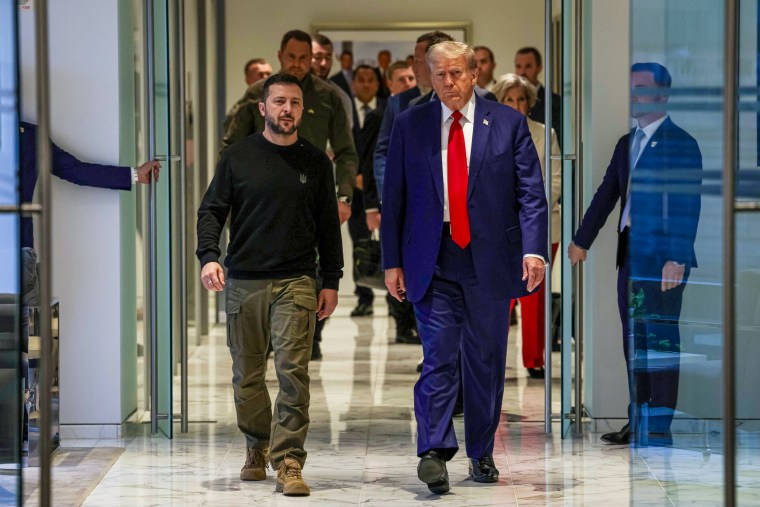President-elect Donald Trump said Wednesday he will nominate retired Gen. Keith Kellogg to serve as assistant to the president and special envoy for Ukraine and Russia.
“Keith has led a distinguished military and business career, including serving in highly sensitive national security roles in my first administration. He was with me right from the beginning! Together, we will secure PEACE THROUGH STRENGTH, and Make America, and the World, SAFE AGAIN!,” Trump said in a statement announcing his decision.
During Trump’s first administration, Kellogg served as Chief of Staff and executive secretary to the National Security Council. He previously served in the military for over 35 years.
Kellogg in April co-authored a policy paper, obtained by NBC News, outlining how he’d seek to end the war in Ukraine, including potentially conditioning US military aid to Kyiv on their participation in peace talks with Russia.
The paper proposed a ceasefire, with Kellogg and co-author Fred Fleitz writing, “Specifically, it would mean a formal US policy to seek a cease-fire and negotiated settlement of the Ukraine conflict. The United States would continue to arm Ukraine and strengthen its defenses to ensure Russia will make no further advances and will not attack again after a cease-fire or peace agreement, however, will require Ukraine to participate in peace talks with Russia.”
In the paper, the two authors seemed to acknowledge that an end to the war was unlikely while Russian President Vladimir Putin was still leading his country.
“Ukraine would not be asked to relinquish the goal of regaining all its territory, but it would agree to use diplomacy, not force, with the understanding that this would require a future diplomatic breakthrough which probably will not occur before Putin leaves office,” Kellogg and Fleitz wrote.

The two also explained that it would be hard for Ukraine to accept a peace agreement “that does not give them back all of their territory or, at least for now, hold Russia responsible for the carnage it inflicted on Ukraine.”
The Trump transition team did not immediately respond to a request for comment about whether the president-elect endorses Kellogg’s policy paper.
Trump repeatedly promised during the campaign to bring an end to the war, but has not offered many specifics for how he would do so. Meeting with Ukrainian President Volodymyr Zelenskyy in SeptemberTrump told reporters, “We’re going to work very hard with both parties to try and get this settled and get it worked out.”
He added, “It has to end. At some point, it has to end. He’s gone through hell. His country has gone through hell.”
At an earlier campaign event in Georgia, Trump complained about US aid to Ukraine, saying, “Every time Zelenskyy comes to the United States, he walks away with $100 billion. I think he’s the greatest salesman on Earth. But we’re stuck in “That was – unless I’m president. I’ll get it done.”
Trump and Zelenskyy have a complicated relationship. A July 2019 phone call between the two leaders led to Trump’s first impeachment. Trump was accused of withholding aid to Ukraine in an effort to pressure Zelenskyy to investigate Joe Biden and his son Hunter Biden. He denied wrongdoing and was later acquitted in the Republican-led Senate.
Vice president-elect JD Vance has also spoken out against Ukraine aid, as has Robert F. Kennedy Jr., Trump’s pick to lead the Department of Health and Human Services.
“I know what Donald Trump was thinking while he was having that meeting. He was thinking, I want to turn this guy over and hold him by his legs and shake all the money out of his pockets and hope it adds up to $208 billion… That’s what the Democrats gave him, and we need to bring that money home,” Kennedy said at a Trump rally in September.
During an interview with NBC News’ “Meet the Press, Vance also expressed support for holding peace talks. “I think it’s important if we’re ever going to end the war in Ukraine, fundamentally, at some level, we’re going to have to engage in some sort of negotiation between Ukraine, between Russia, between our NATO allies in Europe, ” he said.
Vance had long-criticized the US’ aid to Ukrainewriting in an op-ed earlier this year, “There is frankly no good reason that aid from the US should be needed. Europe is made up of many great nations with productive economies.”
And hey told a podcast in Feb. 2022, just before Russia invaded Ukraine, “I don’t really care what happens to Ukraine one way or another.”

